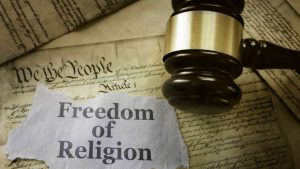Home » Commentary » Opinion » Religious freedom: the decision lies with us
· The Newcastle Herald
 Leaked details from the Ruddock Inquiry into religious freedom have led some critics to baselessly whip up fears that gay pupils are in imminent danger of being expelled from religious schools simply because of their sexuality.
Leaked details from the Ruddock Inquiry into religious freedom have led some critics to baselessly whip up fears that gay pupils are in imminent danger of being expelled from religious schools simply because of their sexuality.
Religion has been front page news since last year’s vote on same-sex marriage. Faith-based opposition to gay marriage was denounced as “homophobic bigotry which would lead to youth suicide”. Then Malcolm Turnbull appointed the Ruddock Inquiry to examine the true extent of our religious freedoms.
Ruddock received 16,000 submissions and reported back in May. But nothing was known about the report until last week’s leak. The big story was that now religious schools were to be given the freedom to expel gay students. Christianity’s critics leapt on the rumour.
Totally ignored was the fact that the federal Sex Discrimination Act already allows schools to discriminate if their reasons are in accordance with religious teaching or doctrine. Also ignored was the fact the Ruddock actually wants to tighten those provisions and limit the exemptions — and ensure that faith-based schools always act in the best interests of the child.
No Christian school is going to expel any student simply because of their sexuality. Nor has any journalist yet been able to identify a single Christian school in Australia where booting gay kids is standard practice. It would go totally against the grain of what a Christian school aims to be: a place of tolerance and inclusion.
Certainly, it’s not a stance shared by leading Muslim educators, who would prefer Islamic schools uphold that religion’s very strict teachings about homosexuality when it comes to enrolling students. Yet blatant discrimination by any religious schools against gay kids strikes most Australians as harsh and cruel.
“No Christian school is going to expel any student simply because of their sexuality.”
But the position becomes more complex when the debate turns to the rights of religious schools to hire staff – especially teachers – who conform to, and uphold, the fundamental tenets of the faith.
Australia’s Grand Mufti has already expressed open hostility to the idea of Islamic schools hiring gay teachers; saying they engage in “abnormal practices that contradict nature.”
Most Christian leaders and educators will distance themselves from the Grand Mufti’s tirade and would never denigrate a person in that way. Instead, their concern is with upholding the culture and Christian ethos of schools so that the tenets of the Christian faith can inform every aspect of the school’s life.
After all, it is precisely because of that ethos that many parents — of all faiths (and sometimes none) — choose to send their kids to Christian schools. They want their kids to be imbued with the values expressed in Christian life: tolerance, forgiveness, compassion, and attention to the needs of others.
And because we live in a free country, those who don’t want their kids exposed to that kind of environment are completely free to choose other schools they consider more appropriate.
But in order that religious schools can maintain their distinctive ethos, few would deny they need to appoint staff sympathetic to the tenets of the faith.
In order to shape the life of the community according to its religious tradition, a faith-based school is likely to have a hiring policy that covers the personal lives and opinions of its staff. A person who openly renounces the school’s stand on Christian ethics or doctrine might struggle at interview.
Equally, if somebody was applying for a position with Greenpeace or the Australian Greens, the applicant’s beliefs, lifestyle, and opinions would certainly be relevant. A person committed to eating whale meat and who thought the future lay with fossil fuels might struggle in those interviews.
If we really are committed to a diverse society where a wide range of beliefs and practices can be openly adopted, we will also need to be committed to a wide diversity of organisations and communities – even though at times the beliefs and practices they espouse offend us.
The debate about religious freedom shows we need to make an important choice: either we can opt for all the constraints of a totalitarian society where dissent is stamped out and conformity rigidly enforced, or we can cherish living in an open society with all its untidy complexity and diversity. The decision lies with us.
Peter Kurti is a Senior Research Fellow at the Centre for Independent Studies.
Religious freedom: the decision lies with us